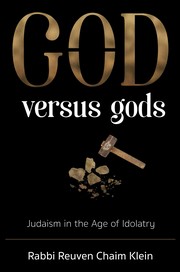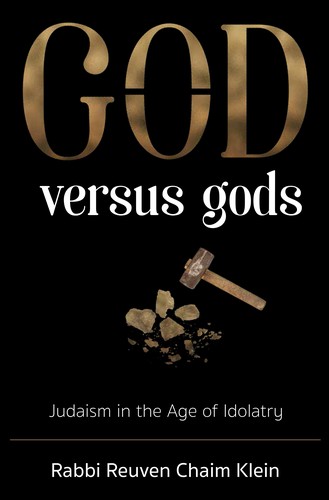Check nearby libraries
Buy this book

God versus Gods: Judaism in the Age of Idolatry seeks to understand the Bible's accounts of polytheism, follows its history, and focuses on the struggle between Jewish Monotheism and pagan/idolatrous cults in the Biblical period. An extended section is devoted to understanding the Talmudic concept concerning the paradigm shift which emptied the world of the Evil Inclination for Avodah Zarah, and its implications from a religious perspective.
This unique work delves into the Bible's view of the history of idolatry, as well as the hermeneutical, philological, Kabbalistic, and Halachic approaches to this topic taken by various Rabbinic figures through the ages. The second part of this book consists of an encyclopedia that lists and elaborates upon ever foreign deity mentioned in the Bible. The author also compares and contrasts traditional Jewish views to those of modern-day academia (addressing archeology and philology of the Levant), offering proofs and difficulties to both approaches.
As the old saying goes, "Two Jews, three opinions." In almost every chapter, more than one way of looking at the matter at hand is presented. In some cases, the differing opinions can be harmonized, but ultimately many matters remain subject to dispute. Hopefully, the mere knowledge of these sources will whet the reader's intellectual curiosity to learn more.
Written by a brilliant young scholar, God versus Gods: Judaism in the Age of Idolatry is ground-breaking, intriguing, and remarkable.
Check nearby libraries
Buy this book

Subjects
judaism, idolatry, polytheism, bible, tanach, tanakh, prophets, kings, judges, isaiah, jeremiah, judah, israel, idols, idol worship, avodah zarah, god, gods, paganism, Bible, commentaries| Edition | Availability |
|---|---|
|
1
God Versus Gods: Judaism in the Age of Idolatry
2018, Mosaica Press
Hardcover
1946351466 9781946351463
|
aaaa
|
Book Details
Table of Contents
Edition Notes
Contributors
The Physical Object
ID Numbers
Excerpts
People’s adherence to idolatry despite God’s repeated injunctions
against it. In fact, this is the Torah’s quintessential prohibition. In this
work, we explore the history of the struggle between Judaism and idolatry
and seek to clearly record how this pattern played out historically.
In doing so, we delve into the general history of avodah zarah (which
literally means “foreign worship” and is the generally used term for
“idolatry”) and trace its influences on the Jewish People throughout
the Biblical period. As we clarify Biblical stories related to idolatry, we
gain a better understanding of the Bible itself, as well as the history of
Judaism.
In this volume, we focus on the historical aspects of idolatry from
its very beginnings until its eventual decline with the demise of the
idolatrous temptation. As idolatry became more and more entrenched
worldwide, it became more and more complex. People developed various
systems of worship, with like-minded individuals joining to form cults.
Even when the Jews strayed after idolatry, they did not regress into
worshipping arbitrary images. For example, R. Saadia Gaon (882–942)
writes that the Jews built the Golden Calf deliberately in that form; it
was not mere happenstance that they chose the form of a calf. Different idolaters preferred different forms of idolatry: Some attributed supernatural
powers to living animals or other elements of nature and worshipped
them accordingly, while others wished to worship images which they had
fashioned. Some only worshipped humanoid idols (to which different
cults attributed various names), while still others only worshipped the
perceived astral forces.2 We will explore how these different pagan groups
may have impacted the Jewish People during the Biblical period, and how
the guardians of monotheism resisted their influence.
Links outside Open Library
Community Reviews (0)
Feedback?| October 9, 2021 | Edited by ImportBot | import existing book |
| September 27, 2019 | Edited by Reuven Chaim Klein | Edited without comment. |
| September 27, 2019 | Edited by Reuven Chaim Klein | Edited without comment. |
| September 27, 2019 | Edited by Reuven Chaim Klein | Edited without comment. |
| September 27, 2019 | Created by Reuven Chaim Klein | Added new book. |









